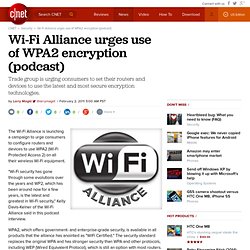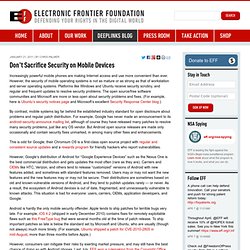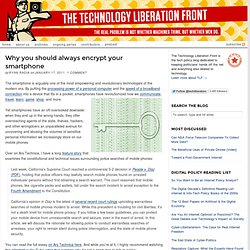

Wi-Fi Alliance urges use of WPA2 encryption (podcast) The Wi-Fi Alliance is launching a campaign to urge consumers to configure routers and devices to use WPA2 (Wi-Fi Protected Access 2) on all their wireless Wi-Fi equipment.

"Wi-Fi security has gone through some evolutions over the years and WP2, which has been around now for a few years, is the latest and greatest in Wi-Fi security," Kelly Davis-Kelner of the Wi-Fi Alliance said in this podcast interview. WPA2, which offers government- and enterprise-grade security, is available in all products that the alliance has anointed as "WiFi Certified. " The security standard replaces the original WPA and has stronger security than WPA and other protocols, including WEP (Wired Equivalent Protocol), which is still an option with most routers. WEP was introduced in 1997 and was largely supplanted by WPA and WPA2. Podcast. Don't Sacrifice Security on Mobile Devices. Increasingly powerful mobile phones are making Internet access and use more convenient than ever.

However, the security of mobile operating systems is not as mature or as strong as that of workstation and server operating systems. Platforms like Windows and Ubuntu receive security scrutiny, and regular and frequent updates to resolve security problems. The open source/free software communities and Microsoft are more or less open about security problems and fixes. (For example, here is Ubuntu’s security notices page and Microsoft’s excellent Security Response Center blog.) By contrast, mobile systems lag far behind the established industry standard for open disclosure about problems and regular patch distribution.
This is odd for Google; their Chromium OS is a first-class open source project with regular and consistent source updates and a rewards program for friendly hackers who report vulnerabilities. Android is hardly the only mobile security offender. Why you should always encrypt your smartphone. The smartphone is arguably one of the most empowering and revolutionary technologies of the modern era.

By putting the processing power of a personal computer and the speed of a broadband connection into a device that fits in a pocket, smartphones have revolutionized how we communicate, travel, learn, game, shop, and more. Yet smartphones have an oft-overlooked downside: when they end up in the wrong hands, they offer overreaching agents of the state, thieves, hackers, and other wrongdoers an unparalleled avenue for uncovering and abusing the volumes of sensitive personal information we increasingly store on our mobile phones.
Over on Ars Technica, I have a long feature story that examines the constitutional and technical issues surrounding police searches of mobile phones: Last week, California’s Supreme Court reached a controversial 5-2 decision in People v. You can read the full essay on Ars Technica here. Starbucks Starts Accepting Mobile Payments Nationwide. Nearly 6,800 company-operated Starbucks stores in the U.S. will begin accepting mobile payments Wednesday.

Customers using the Starbucks Card Mobile app on their iPhone, iPod touch or BlackBerry will now be able to use those devices as tender. The nationwide rollout marks the official launch of the Starbucks Card Mobile payment program, which has been piloted at Target stores and select San Francisco, Seattle and New York Starbucks locations. Starbucks Card Mobile [iTunes link] lets users add their Starbucks Cards, track rewards and reload cards as needed via PayPal or credit card. To pay with their phone, app users simply select "touch to pay" and hold up the barcode on their mobile device screen to the 2-D scanner at the register.
An Android application is also said to be in the works, but the company has yet to disclose a release date. Starbucks is using its own custom-built technology to enable the 2-D mobile barcode scans. Image courtesy of gumption, Flickr.